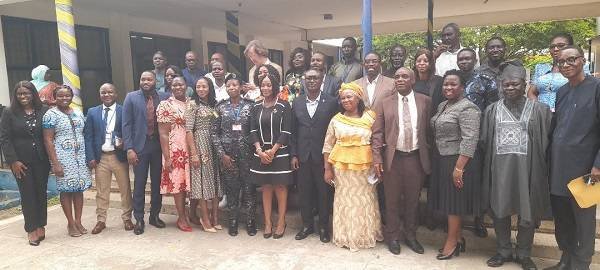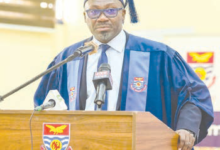Maritime crimes major obstacle to rapid economic development

Organised maritime crimes such as piracy, kidnapping of crew for ransom, illegal fishing, illicit trade and smuggling in the Gulf of Guinea (GOG) have been identified as an obstacle impeding development on the African continent, despite its abundant resources.
According to Acting Vice Chancellor of the Regional Maritime University (RMU), Dr Jethro W. Brooks, maritime crimes are the major obstacles to harnessing the huge resources in the maritime sector for rapid economic growth.
Consequently, he said maintaining a vibrant national economy required attention to the maritime sector economy and also crucial for stakeholders to coordinate and communicate in ways that would promote maritime security and governance.
Dr Brooks was speaking at the recently ended six-week Support for West Africa Integrated Maritime Security (SWAIMS) training in maritime affairs and security at the RMU in Accra.
Sponsored by the European Union (EU), the training which was the fourth edition and the last session within a four-year period, formed part of efforts to build capacity and competencies of staff and personnel of maritime focus agencies and institutions across Africa to combat maritime insecurity in the GOG.
Dr Brooks again said the decline in piracy in recent times could be attributed to the increased cooperation, collaboration and coordination among GoG states, capacity building of maritime professionals, and support from international partners and the various initiatives towards combating maritime crimes.
“We cannot however rest on our oars as we aim to further reduce the threat of piracy and other transnational organised crimes in the region because of the increase in oil theft and illegal oil bunkering in the region in 2023,” he stated.
“The RMU with the support of the EU has been in the forefront in achieving some of the specific objectives of SWAIMS, especially in the area of strengthening regional training to build operational capacities in governance and legal frameworks, operations in the regional coordination centres, information and Incidence Reporting and IUU fishing,” he underlined.
Participating countries include Ivory Coast, Niger, Togo and Ghana who were taken through areas of maritime insecurity by renowned experts from maritime industry, defense and security, shipping and fishing industry, and academia and research institutions. They received certificates after the training.
The Project Coordinator, Augustus Addy-Lamptey, said the RMU/ SWAIMS project had been successful, meeting the 72 participants target within the four years.
He said since 2020 when the programme started, there had been tremendous impact as far as maritime security at the GOG was concerned, though a lot more should be done to completely eradicate maritime crime.
“Maritime crime in the GOG had reached unprecedented levels in 2020 with 18 incidents registering 132 kidnapping of crew. There was a drastic decline to 35 in 2021 and 19 in 2022, while 2023 saw an upturn of 37 with 17 recorded this year. This picture shows that all is not clear yet and we must not go to sleep on this,” he explained.
The GOG which spans 6,000km, he said, provided varied resources for the economic development of the region, hence the need for efforts to be made to ensure security on its waters.
The EU representative, Mr Jean Pierre Bardoul, congratulated the RMU for hosting the training which would go a long way to assist the fight against maritime crimes.
BY MICHAEL D. ABAYATEYE





